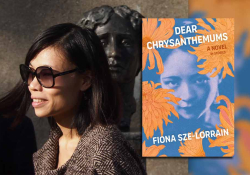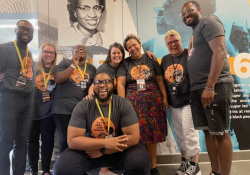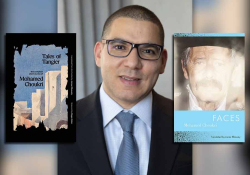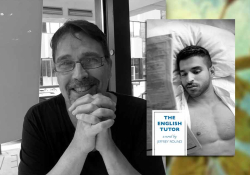Turning the Ocean Inside: A Conversation with Rajiv Mohabir
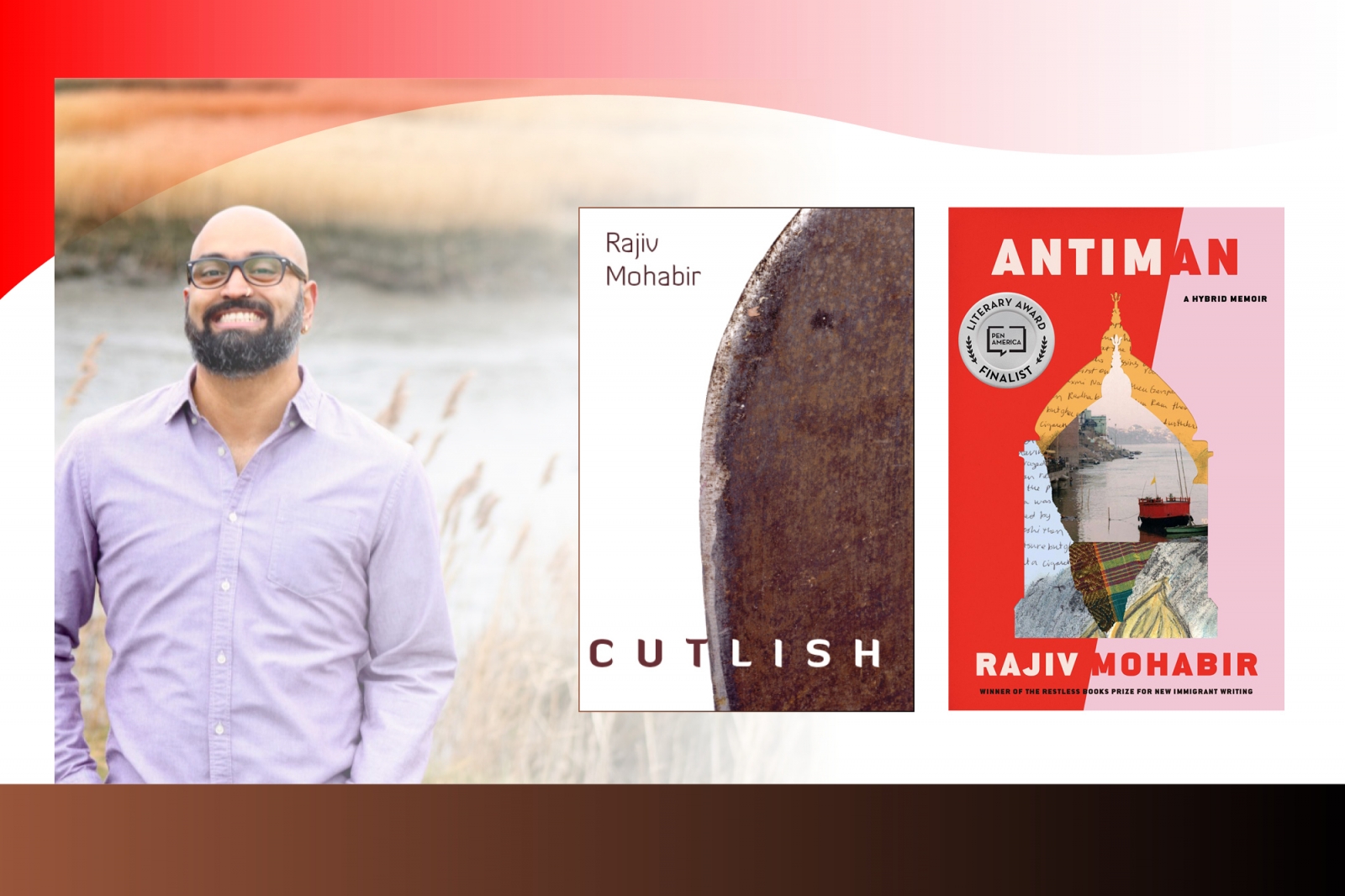
During the University of California Riverside’s 45th Writers Week in February 2022, Rajiv Mohabir read from his book of poems Cutlish (2021) and his memoir Antiman (2021) before participating in a live Q&A alongside Kyle Lucia Wu and Molly Fisk. Following Writers Week, Mohabir continued the conversation, inviting readers into his artistic process of looking behind to move forward, a process grounded, in part, in his inquiries into ancestral memory, challenging of cultural boundaries, and, of course, poetics.
Carlina Perna: Two of your latest works were released in 2021: your book of poems Cutlish (Four Way Books, 2021) and your memoir, Antiman (Restless Books, 2021). As you developed these projects, how did they inform or speak to one another?
Rajiv Mohabir: I never thought these books would come out in the same year! It has been almost a decade since I began working on Cutlish, which feels to me kind of like the main work that allowed me to have the memoir come out of me, if that makes sense. It’s like I am turning that ocean inside of me, and out of it, according to mythology, comes poison that’s toxic to everyone, but there also comes nectar, like the cow that gives good luck, and the goddess Lakshmi. The speaker in the book Cutlish is the speaker from the end of the memoir—the speaker began to write these poems after the Aji passes away, which is the end of the memoir.
I began Cutlish in 2012—that’s when the poem structures came to me, you know, the chutney poem, and thinking through the New York landscape, living in Queens at the time, which is also a very important part of the memoir. It was such a risk poetically to do Cutlish, I think, because my ethnic community is tiny, big in New York City, but tiny tiny in the world—what is it I stand to gain from it? It’s not so much about what I’m gaining professionally, but these are the poems I have to write, this is my art that’s coming out. I started writing the memoir in 2015—that’s when the first essays started to come out. I didn’t think of the memoir as a whole project until 2017.
Perna: In the acknowledgments pages of Antiman, you share appreciation for various writers, specifically Devi Laskar, who “broke open [your] thoughts on genre.” Did Antiman always exist in a hybrid form in your mind? How did your own thinking about, and relationship to, genre evolve over the development of this text?
Mohabir: The memoir started out as a collection of essays. I was living in Hawaii, and I was trying to position my book of poems, The Taxidermist’s Cut, in the world. In order for there to be a readership in the continental United States, a friend, Rigoberto González, suggested that I write essays. I never really thought of very distinct borders because, in my mind, the essays were actually just to help my poems.
I pulled out all of the narrative essays that I had written about ten years of my life, and I put them together. I didn’t really know what the through line was as I was putting it together—and this is going to betray my genre thinking—but I thought: What if I try to assemble these like I’m putting together a collection of poems instead of a linear narrative from Point A to Point B? While the essays are chronologically organized, what if it’s more of an emotional kind of thing that I’m trying to do? So, I tried that, and then I was like: Oh, I have these poems that kind of have similar themes which resonate here. What if I shuffle those in, too? My friend Devi Laskar looked at the different kinds of work I was trying to put together, and she recommended several poets to me. Chelene Knight’s Dear Current Occupant was probably the most instrumental in my thinking of how to put together this memoir.
It was hard trying to find an agent, and I didn’t find an agent, and I couldn’t find an agent or representation for this book. I was shocked out of my mind that Restless Books selected it (for the 2019 Restless Books Prize for New Immigrant Writing). Following an editorial meeting with Nathan Rostron, who was my editor at Restless Books, I tried to iron out pieces so it became more of a gradient than separate pieces, but I did want to leave a lot of dissonance, too, so I played with tension, release, and narrative. I never actually thought I would write prose—I used to laugh at prose writers and be like: “I don’t get what you do!” And then I kind of did it, but in a way that doesn’t betray poetry or my poetic inclinations.
I do think of writing as a kind of preservation, or preserving act, but I don’t think it’s just about preservation.
Perna: In Antiman, you call writing “a skill and a bravery that you have after refusing to burn up in flame” and “an act against death.” You also present translation, specifically of your Aji’s songs, as an act of “preserving an inheritance.” Can you share more about how you understand writing as an act of preservation?
Mohabir: I do think of writing as a kind of preservation, or preserving act, but I don’t think it’s just about preservation. I think it’s also about moving forward and knowing where you come from in order to expand out. I think the mythology, stories, and songs I’m grounded in are probably the road I’ve been set down on; now, where I go from here, it’s really up to me to make my own choices. What I like about this is that the preservation is not so much about looking behind as it is moving it forward. I think remembering who we are and where we’ve come from, while pushing forward and challenging cultural boundaries, is the responsibility I feel charged with as being a writer.
My experiments with my Aji’s language, for example, and her songs and stories, they’re in a completely different context, but still within the context of my own body that I’ve inherited from my Aji and my ancestors. What reality will I speak into the future? Now that’s a question I have, and I think writing can do that. “Amazon River Dolphin,” a long poem in Antiman, questions things about gender normatives and sexuality, things my grandmother’s generation wouldn’t have asked in the same ways, but here I am, standing in a new kind of iteration of all these things—I have started to ask these questions through my writing using the mechanisms that are coded in my bones and in my own ancestral memory.
I used to teach Hindi for the Indo-Caribbean Alliance in New York City. It was cool to do because it was about bringing our languages back to our spaces, and I think writing can do that too, and my translations for sure. I like to think of it as letting meanings being opened to the people who are interested but also as a reverse map back to the language—the people could read my English translations and then see the Hindi and Bhojpuri and imagine the sense or the understanding back into those words. That’s why I’m like: It has to be bilingual, it has to have both of the things, or all of the things, in order for it to feel like it’s accomplishing that for me.
It’s sad to think that her language is dying but exciting to know I’m finding new ways to use it in my own life to make it meaningful again to me and, hopefully, to my community.
What reality will I speak into the future? Now that’s a question I have, and I think writing can do that.
Perna: In Antiman, you write: “Diaspora is a queer country // How can you be at once two species from two places.” As a poet (and writer) and scholar, how do you navigate the theoretical frameworks that engage with the identities and experiences central to your writing?
Mohabir: This is the murky area of diaspora. Diaspora is not always queer. Diaspora can be very conservative. The Vishva Hindu Parishad (VHP) of the United States is sending money back to the conservative party in India, and not just from the United States; the VHP has its tendrils in the Caribbean, too, which is pretty awful. These are diasporic spaces reaffirming conservative views and parties.
A lot of queer theory that I’ve read and studied comes from the Western world, and there’s a new kind of queer colonization that’s happening—you see it in India for sure, and you see it in the Caribbean absolutely. I feel like as soon as theory can say something is one thing, there will always be contestation academically, but what it does is it attempts to locate things from the outside—it’s all very anthropological and colonial in that way for me. I think when it comes to certain things—postcolonial theory, these things, you know, where it is an undertaking happening in third world spaces or the developing world as countercritique to hegemonic Western theorizing, or the academy—I think there’s a lot of space there, but it’s still dominated by people with access, whether it’s power, control, money.
This is the murky area of diaspora. Diaspora is not always queer. Diaspora can be very conservative.
Learning the songs and stories of my grandmother, learning about our cultural inheritance, was hugely discouraged by my family. I was going to college as a first-generation college-goer on my father’s side with this conflicted idea: You go to school so you can learn a trade or learn a business so you can make money—what if I went to school for writing poems? It’s not a possibility. And going to school to learn my grandmother’s language, too? That’s not a possibility either because we escaped that, and it’s backwards and leads you not into anywhere except for illiteracy. And what value is there in that? Thinking how my grandmother, or the Aji character in the memoir, also sits outside of the family in this way—her acculturation is transgressive to the acculturation my parents’ generation wants for their families. So that also represents queerness to the family, the being outside of what the expectation, the cultural norm for whoever is making those rules, and in my case, in the memoir, my father.
I think of poetry, and the space of writing, as entering into that deeply spiritual and theoretical space which blends those things together. As soon as I was able to express and understand a kind of queerness I could inhabit for a time, and how I could understand my queerness as evolving through time, it opened up a whole new world. It broke open the script for me so that things like poetry were possible. Interventions, in order for them to be potent, don’t need to be written in academic language that is inaccessible to people, just general people. I see writing as having that power, and I believe my writing is critique as well as art.
José Muñoz always says: “Queerness is on the horizon.” We’re not going to understand the queerness of anything in the moment, other than through performing a kind of reading—the history or what’s come before kind of thing, looking backward, or looking back. When I think about binaries as being mythological, what I mean to say is that human expression, whether it’s sexual or gender presentation, all this stuff is a phenomenon that is—I don’t want to say it’s fake—I’ll say it has no rooting in anything other than human culture. People, and societies because we live in societies, actually derive pleasure from gender expression, whatever gender expression that may be. But that’s not to say that—and this is the poststructuralist and postmodernist in me—there’s any underlying truth that can govern every single understanding of gender in time, place, and construction. I think the thing I’m interested in here is thinking about genre-play as gender-play.
Perna: When speaking with the sannyasi or baba in Varanasi about the Ramayana and song, he says to you: “One day your questions will change, beta.” Reflecting on this moment, the questions you were asking then and the questions you’re asking now, do you have anything to share about which ones have stayed the same and which have changed?
Mohabir: I’ll start with the questions that have stayed the same. And those are: Do you have a song you can sing about this? I’m still really obsessed with hearing people’s songs and learning from them.
My questions about Ramayana structure, though, have changed for sure. My questions have changed into: What will my contribution to this discourse be? There are so many different interpretations, and the diversity of it is the beauty of it. As I’m thinking through my translation of the Ramayana, I’m like: Okay I know this is going to anger a lot of people and make Hanuman (monkey god) a very queer character—what can I get away with? I identify with Hanuman, because my last name, Mohabir, is one of the names of Hanuman; it means “great warrior,” and it’s one of things that’s given to Hanuman. When I think about Ram, and I think about devotion, I think about devotion that I know in real life, which is sex, or related to, and that kind of emotional space. How much of the Ramayana can influence or can I rewrite into what I need it to be to save the lives of other queer folks, of other people with mixed-caste and Muslim ancestors and ancestry as well as Muslim presence?
Indo-Caribbean identity can represent so many different things. I have North Indian ancestors, I have South Indian ancestors, I have Bengali ancestors, and I have ancestors from the northeast of India, which raises the question of indigeneity, potentially, in my ancestry. Functionally, I am none of those things. Functionally, I am Hindu and Christian, and so I’m thinking about how I can use the Ramayana to open up spaces to embrace all of the parts of me and therefore the parts of my community.
I’m thinking about how I can use the Ramayana to open up spaces to embrace all of the parts of me and therefore the parts of my community.
The questions definitely have changed not just in their linearity—the universe the question can be asked in is the thing that has changed. The baba was probably, you know, maybe a little psychic in that moment. And I wonder if the baba had that realization. Maybe he did. Maybe he knew, and he was like, “All of this is illusion anyway, so why are you asking?” Which, you know, looking back now, I can see I was so caught up in those particular questions I had, but if I didn’t ask them, it wouldn’t lead me to this kind of different understanding, so I’m grateful to that Rajiv, that twenty-one, twenty-two-year-old Rajiv.
February 2022
When you buy a book using our Bookshop Affiliate link on this page, WLT receives a commission. Thank you for your support!

Rajiv Mohabir is the author of three poetry collections, the latest of which is Cutlish (Four Way Books, 2021; finalist for the 2022 National Book Critics Circle Award), and translator of I Even Regret Night: Holi Songs of Demerara (Kaya Press, 2019), which received the 2020 Harold Morton Landon Translation Award from the Academy of American Poets. His memoir, Antiman (Restless Books, 2021; finalist for the PEN Open Book Award and the 2022 Publishing Triangle Randy Shilts Award and the Lambda Literary Award for Gay Memoir), received the 2019 Restless Books Prize for New Immigrant Writing. Currently he is an assistant professor of poetry at Emerson College.

